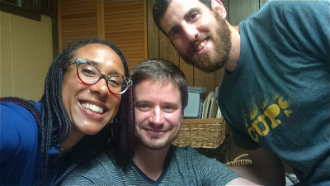CPT Reflection: Grief is part of Christian peacemaking

Sarah, Michael and Jonathan Brenneman
Source: Christian Peacemaker Teams International
Michael J Sharp was a close friend. In the Democratic Republic of the Congo (DRC) he was a Mennonite witness, scholar and peacemaker. Over five years, first with Mennonite Central Committee and then with the United Nations (UN) group of experts, he cultivated relationships of trust and respect with people who were experiencing dreadful violence, exploitation because of government corruption, and the oppressive impact of generations of corporate-colonial resource extraction. His teamwork there included demobilizing armed groups, investigating human rights abuses, and reporting to the UN Security Council towards their goal of creating the conditions for peace in the Great Lakes region of Africa.
On 12 March 2017, Michael, and UN colleague Zaida Catalan were seeking to uncover the truth of the eruption of violence in Congo’s central Kasai region, when they were stopped, and killed. The violence in Kasai began in August of 2016 after government forces killed Kamwina Nsapu, a tribal chief and militia leader, who had resisted DRC President Joseph Kabila. In January of 2017 Michael and Zaida made an initial trip, documenting five mass graves in the region. Since then the number had risen to 23 mass graves.
How do those close to these situations process the loss of such key peacemakers? Eastern Mennonite University, where Michael attended undergraduate has an international program for peacemakers, some of whom have also returned home to face political violence, torture, and death.
Though we are in circles where we train and study as hard for peace as soldier train and study for war, we do not have to “soldier on” when one of us falls. There is no national myth in front of which we have to choke back our tears to appear strong “for the cause.” Christian Peacemaker Teams (CPT) immediately gave me time off of work to grieve and gather with loved ones. We sat with our devastation, did not pretend that the world made sense or that “God has everything under control,” nor try to keep everything in perspective.
Mennonites and Anabaptists center Christ’s call to be peacemakers, knowing that there is physical, emotional, and spiritual risk involved. Jesus models that the way of peace is filled with turmoil, one illustration is Jesus’ long night weeping in Gethsemane. Giving space to grief can provide clarity to recover. Christ rose from that devastated moment to stay true to his mission and extend healing touch to his captor’s ear (Luke 22:51).
Staggering numbers of human, animal, and environmental tragedies cross our Facebook feeds every day. We often desensitize and decontextualize. But when you know someone personally who suffered and died, all the pain of all of those numbers and situations rushes in, and pounds the body: searing, graphic, unrelenting. Part of peacemaking is to let that in, and be raw and sensitized by it. By having compassion for ourselves in these moments, asking for help or to be held, even deeper commitment to ending cycles of violence can grow. Our circle of care widens, we open our heart-mind to the reality of the many people and places whose names we don’t know, but whose lives mattered just as much as our friend’s.
Our discipleship inspired peacemaking always happens in a particular political context. In Michael’s case, it’s too trite to simply see him as a martyr for peace: he and his colleagues were searching for mass graves in the Kasai region and someone did not want them to complete that work. It is up to us to make sure his work continues. Rings of support in a community in grief mean that there are some that coordinate meals, some that do logistics for the family, and some that prepare for advocacy to honor and continue the work. To do international peacemaking well we need to be prepared to collectively exert political will on behalf of those most impacted by the violence of war and injustice in the particular political landscape at home and abroad.
The wider church can honour a peacemaker that has been killed not by putting them on a pedestal, and distancing ourselves from the pain of loss, but rather letting it enter us. Aware of our own complexity, we can embrace the complexity of the slain peacemaker’s story and learn about the political context. Taking time to stop means disrupting our business as usual and getting a chance to examine the way we have been conformed to the patterns of the world, especially the reliance on violence to maintain our lives. Connecting with grief rather than pushing-through will re-order priorities once we are moving again.
Sarah and Tim originally wrote the reflection for Sojourners Magazine. The Sojourners' version can be found here:
https://sojo.net/magazine/ july-2017/when-christian- peacemaking-requires-...


















